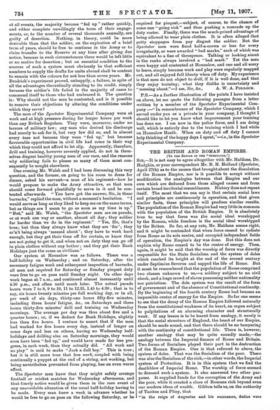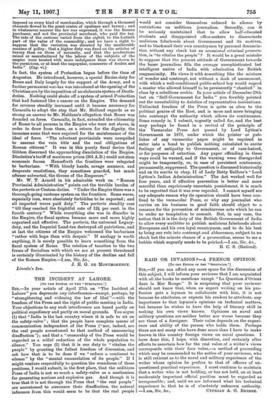THE BRITISH AND ROMAN EMPIRES.
[To TIM EDITOII OP TEN SPROTATOR.1
SIR,—It is not easy to agree altogether with Mr. Haldane, Dr. Hodgkin, or your correspondent Mr. B. H. Holland (Spectator, April 27th) as to the causes that brought about the dissolution of the Roman Empire, nor is it possible to accept without modification the analogies between that Empire and our own which are deduced from those alleged causes and from certain broad territorial resemblances. History does not repeat itself. The most that we can say is that certain social laws and principles are continuously in operation, and that given similar facts, these principles will produce similar results. The population of the Roman Empire had very little in common with the population of the British Empire. It is absolutely true to say that force was the social ideal worshipped by the Roman, while freedom is the social ideal worshipped by the Briton. So far, at any rate, Mr. Haldane seems right, and it might be contended that when force reeved to radiate from Rome as its sole centre, and occupied independent- fields of operation, the Empire's day was done. But this does not explain why Rome ceased to be the centre of energy. Then, again, it might be said that the worship of force was directly responsible for the State Socialism and the system of doles which reached its height at the end of the second century under Septimius Severna and sapped the life of Rome. But it must be remembered that the population of Rome comprised two classes unknown to us,—a soldiery subject to no civil check, and a huge crowd of slaves possessing neither nationality nor patriotism. The dole system was the result of the form of government and of the absence of Constitutional continuity. By the beginning of the fourth century Rome had become an impossible centre of energy for the Empire. So far one seems to see that the decay of the Roman Empire followed naturally from the constitutional weakness of its heart, an organ subject to palpitations of an alarming character and structurally weak. If any lesson is to be learnt from analogy, it surely is that the social structure of England, the heart of our Empire, should be made sound, and that there should be no tampering with the continuity of constitutional life. There is, however, another analogy that may be quite soundly made,—the analogy between the Imperial finance of Rome and Britain. Two forms of Socialism played their part in the destruction of the Roman Empire. One is that referred to above, the system of doles. That was the Socialism of the poor. There was also the Socialism of the rich,—in other words, the Imperial system of Protection. It is in this system that we find the deathblow of Imperial Rome. The worship of force seemed to, demand such a system. It also answered two other pur- poses. It supplied funds for the corruption of the Army and the poor, while it created a class of Romans rich beyond even our modern ideas of wealth. Gibbon tells us, on the authority of Tacitus and Pliny, that "in the reign of Augustus and his successors, duties were
imposed on every kind of merchandise, which through a thousand channels flowed to the great centre of opulence and luxury ; and in whatsoever manner the law was expressed, it was the Roman purchaser, and not the provincial merchant, who paid the tax. The rate of the customs varied from the eighth to the fortieth part of the value of the commodity; and we have a-right to suppose that the variation was directed by the unalterable maxims of policy ; that a higher duty was fixed on the articles of luxury than on those of necessity, and that the productions raised 'or manufactured by the labour of the subjects of the empire were treated with more indulgence than was shown to the pernicious, or at least the unpopular, commerce of Arabia and India." (Cap. vi.) In fact, the system of Protection began before the time of Augustus. He introduced, however, a special Excise-duty for Rome and Italy largely for the support of the Army, and a further permanent war-tax was introduced at the opening of the Christian era by the imposition of an elaborate system of Death- duties. Nothing could shake off a system of armed Protection that had fastened like a cancer on the Empire. The demand for revenue steadily increased until it became necessary for Caracalla to adopt the step that Mr. Holland regards as so strong an answer to Mr. Haldane's allegation that Rome was founded on force. Caracalla, in fact, extended the citizenship of Rome to all persons in the Empire who were not slaves, in order to draw from them, as a return for the dignity, the immense sums that were required for the maintenance of the ideal of force. "The reluctant provincials were compelled to assume the vain title and the real obligations of Roman citizens." It was in this purely fiscal device that Gibbon discerned the approaching dissolution of the Empire. Diocletian's tariff of maximum prices (301 A.D.) could not stem economic forces. Henceforth the frontiers were relegated to barbarians. " With bloody hands, savage manners, and desperate resolutions, they sometimes guarded, but much oftener subverted, the throne of the Emperors."
Mr. W. T. Arnold in his admirable work on " Roman Provincial Administration" points out the terrible burden of the portoria or Custom-duties. "Under the Empire there was a thorough-going customs system on the frontiers. Some wares, especially iron, were absolutely forbidden to be exported ; and all imported wares paid duty." The portoria steadily rose " till they reached the frightful rate of 124 per cent. in the fourth century." While everything else was in disorder in the Empire, the fiscal system became more and more highly organised and effective. The portoria, the universal Legacy- duty, and the Imperial Land-tax destroyed all patriotism, and at last the citizens of the Empire welcomed the barbarians "rather with hope than with despair." If analogy is worth anything, it is surely possible to learn something from the fiscal system of Rome. The relation of taxation to the two forms of Socialism with which we are at present threatened is certainly illuminated by the history of the decline and fall of the Roman Empire.—Iarn, Sir, &c.,











































 Previous page
Previous page